最新高一英语必修一UNIT4[1]
高一英语必修一Unit4单词讲义
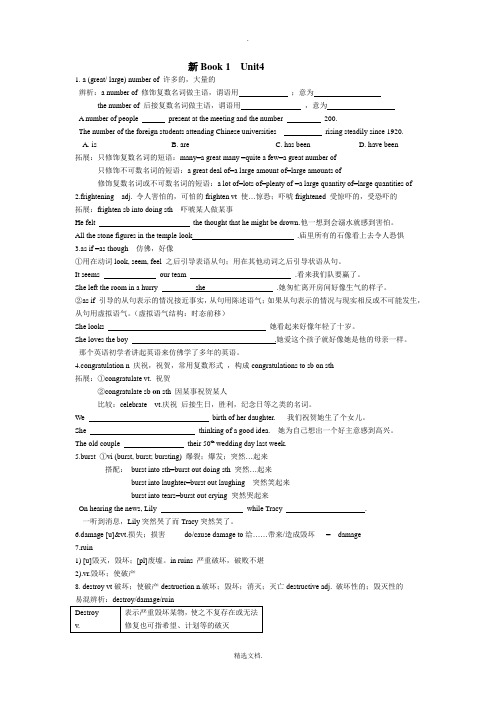
新Book 1 Unit41. a (great/ large) number of 许多的,大量的辨析:a number of 修饰复数名词做主语,谓语用;意为the number of 后接复数名词做主语,谓语用,意为A number of people present at the meeting and the number 200.The number of the foreign students attending Chinese universities rising steadily since 1920.A. isB. areC. has beenD. have been拓展:只修饰复数名词的短语:many=a great many =quite a few=a great number of只修饰不可数名词的短语:a great deal of=a large amount of=large amounts of修饰复数名词或不可数名词的短语:a lot of=lots of=plenty of =a large quantity of=large quantities of 2.frightening adj. 令人害怕的,可怕的frighten vt 使…惊恐;吓唬frightened 受惊吓的,受恐吓的拓展:frighten sb into doing sth 吓唬某人做某事He felt the thought that he might be drown.他一想到会溺水就感到害怕。
All the stone figures in the temple look .庙里所有的石像看上去令人恐惧3.as if =as though 仿佛,好像①用在动词look, seem, feel 之后引导表语从句;用在其他动词之后引导状语从句。
It seems our team .看来我们队要赢了。
高中英语 新人教版高一必修一Unit 4 词汇学习(共75张幻灯片)
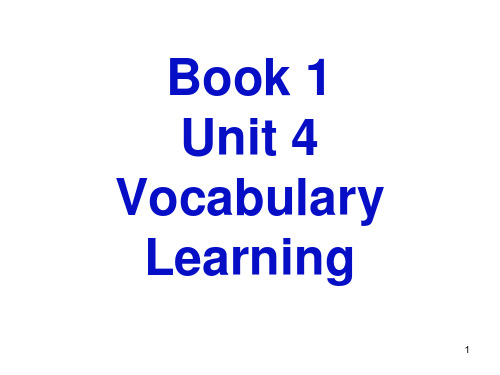
3. destroy vt. 摧毁 ;毁灭
Nearly everything in the city was destroyed. 城里几乎所有的东西都被毁了。
22
5. magnitude n. (地)震级;重大
The Wenchuan earthquake had a magnitude of 8.0. 汶川地震的震级为8.0级。
23
3. evacuate vt. 疏散;撤出 vi. 撤离
Almost 88,000 people have been evacuated from the area. 近88, 000人撤离了该地区。 When the forest fires broke out, we were told to evacuate. 当森林大火爆发时,我们被通知撤离。
11
10. helicopter n. 直升机
12
11.shelter n.避难处
an animal shelter 动物收容处
13
12. crack n.裂纹 ;裂缝
14
13. brick n. 砖 ;砖块
15
14. metal n. 金属
16
15. pipe n.管子;管道 water pipes 水管
27
7. percent n. 百分之 ....
About 75 percent of the city's factories and buildings , 90 percent of its homes, and all of its hospitals were gone. 大约75%的工厂和建筑物、90%的家园、所有的 医院都消失了。
She is a wise woman. 她是一个才女。
暑期备课笔记-高一英语第14讲:必修一unit4核心词汇、短语、句型(1)(教师版)
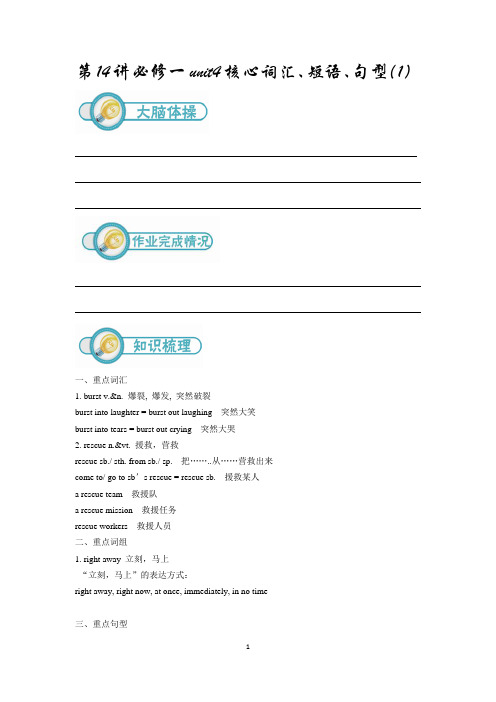
第14讲必修一unit4核心词汇、短语、句型(1)一、重点词汇1. burst v.&n. 爆裂, 爆发, 突然破裂burst into laughter = burst out laughing 突然大笑burst into tears = burst out crying 突然大哭2. rescue n.&vt. 援救,营救rescue sb./ sth. from sb./ sp. 把……..从……营救出来come to/ go to sb’s rescue = rescue sb. 援救某人a rescue team 救援队a rescue mission 救援任务rescue workers 救援人员二、重点词组1. right away 立刻,马上“立刻,马上”的表达方式:right away, right now, at once, immediately, in no time三、重点句型1. Mice ran out of the fields looking for places to hide.老鼠跑到地里找地方躲。
[解释] 这句话中的looking for places to hide 是作ran out of the fields 的伴随状况,这是动词的现在分词形式的一个用法。
现在分词作状语可以表示时间、原因、结果、条件、让步、方式或伴随情况等。
(1)现在分词短语作时间状语,相当于一个时间状语从句,有时可由连词when, while引出。
While reading the book, he nodded from time to time. 他一边看书,一边不时地点头。
Seeing those pictures, she remembered her childhood. 看到那些画,他想起了她的童年。
(2)现在分词短语作原因状语,相当于一个原因状语从句。
高一英语必修一unit4知识点
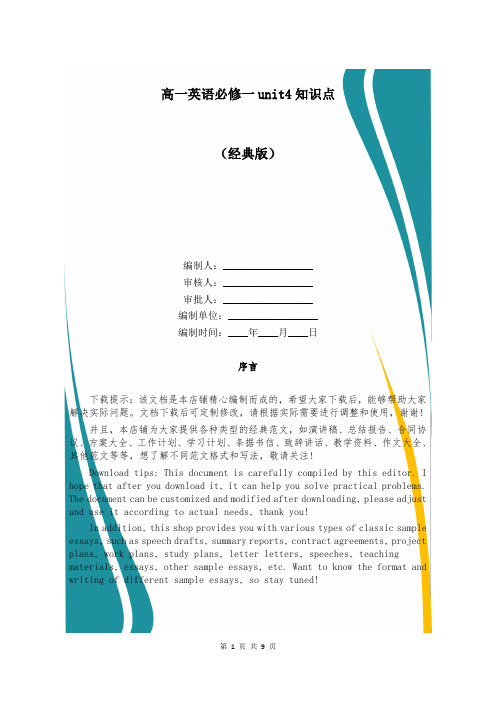
高一英语必修一unit4知识点(经典版)编制人:__________________审核人:__________________审批人:__________________编制单位:__________________编制时间:____年____月____日序言下载提示:该文档是本店铺精心编制而成的,希望大家下载后,能够帮助大家解决实际问题。
文档下载后可定制修改,请根据实际需要进行调整和使用,谢谢!并且,本店铺为大家提供各种类型的经典范文,如演讲稿、总结报告、合同协议、方案大全、工作计划、学习计划、条据书信、致辞讲话、教学资料、作文大全、其他范文等等,想了解不同范文格式和写法,敬请关注!Download tips: This document is carefully compiled by this editor. I hope that after you download it, it can help you solve practical problems. The document can be customized and modified after downloading, please adjust and use it according to actual needs, thank you!In addition, this shop provides you with various types of classic sample essays, such as speech drafts, summary reports, contract agreements, project plans, work plans, study plans, letter letters, speeches, teaching materials, essays, other sample essays, etc. Want to know the format and writing of different sample essays, so stay tuned!高一英语必修一unit4知识点知识能够被获得,并且因为它的本质,知识总是局部的,它永远都不是完整的,所以,一切源于知识的行动也都是局部的、不完整的。
人教版高一英语必修一unit4知识点、练习及答案
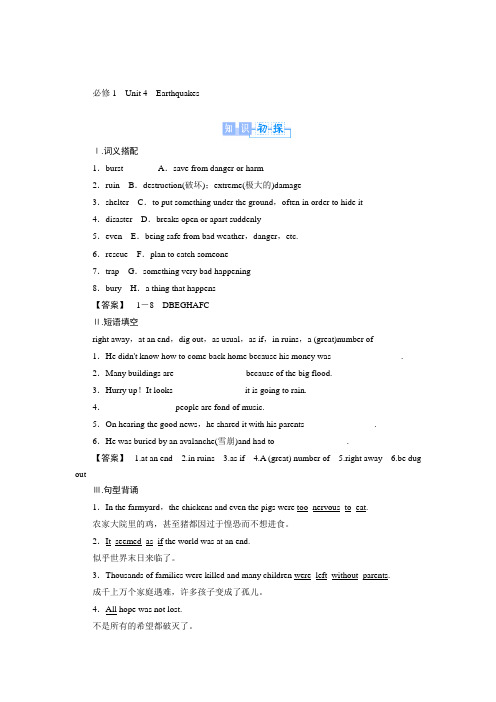
必修1 Unit 4EarthquakesⅠ.词义搭配1.burst A.save from danger or harm2.ruin B.destruction(破坏);extreme(极大的)damage3.shelter C.to put something under the ground,often in order to hide it4.disaster D.breaks open or apart suddenly5.even E.being safe from bad weather,danger,etc.6.rescue F.plan to catch someone7.trap G.something very bad happening8.bury H.a thing that happens【答案】1-8DBEGHAFCⅡ.短语填空right away,at an end,dig out,as usual,as if,in ruins,a (great)number of1.He didn't know how to come back home because his money was________________.2.Many buildings are ________________because of the big flood.3.Hurry up!It looks ________________it is going to rain.4.________________people are fond of music.5.On hearing the good news,he shared it with his parents________________.6.He was buried by an avalanche(雪崩)and had to ________________.【答案】 1.at an end 2.in ruins 3.as if 4.A (great) number of 5.right away 6.be dug outⅢ.句型背诵1.In the farmyard,the chickens and even the pigs were too_nervous_to_eat.农家大院里的鸡,甚至猪都因过于惶恐而不想进食。
高一英语必修一Unit4重点英语词汇和句子
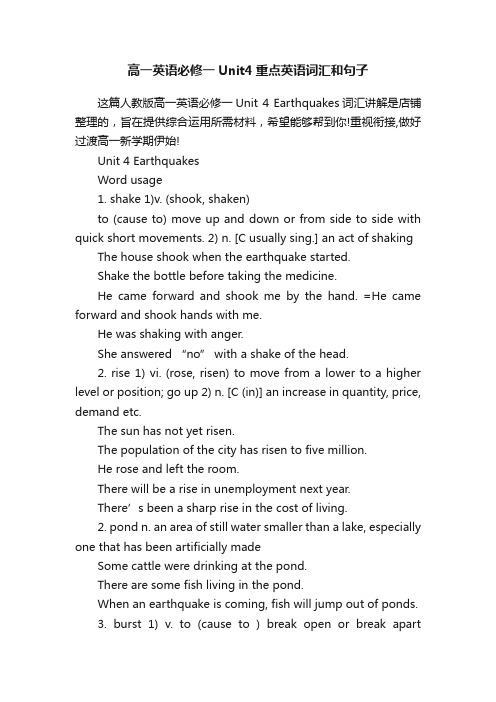
高一英语必修一Unit4重点英语词汇和句子这篇人教版高一英语必修一Unit 4 Earthquakes词汇讲解是店铺整理的,旨在提供综合运用所需材料,希望能够帮到你!重视衔接,做好过渡高一新学期伊始!Unit 4 EarthquakesWord usage1. shake 1)v. (shook, shaken)to (cause to) move up and down or from side to side with quick short movements. 2) n. [C usually sing.] an act of shaking The house shook when the earthquake started.Shake the bottle before taking the medicine.He came forward and shook me by the hand. =He came forward and shook hands with me.He was shaking with anger.She answered “no” with a shake of the head.2. rise 1) vi. (rose, risen) to move from a lower to a higher level or position; go up 2) n. [C (in)] an increase in quantity, price, demand etc.The sun has not yet risen.The population of the city has risen to five million.He rose and left the room.There will be a rise in unemployment next year.There’s been a sharp rise in the cost of living.2. pond n. an area of still water smaller than a lake, especially one that has been artificially madeSome cattle were drinking at the pond.There are some fish living in the pond.When an earthquake is coming, fish will jump out of ponds.3. burst 1) v. to (cause to ) break open or break apartsuddenly and violently, usually as a result of pressure from within and often cause the contents to become widely scattered.2) n. an act of result of bursting; (of) a sudden short period of great activity, loud noise, strong feeling; outbreakThe balloon burst.After ten days of rain the river burst its banks.A burst of hand-clapping followed the ending of the song.4. canal n. an artificial stretch of water dug in the ground to allow ships or boats to travel alongit, or to bring water to or remove water from an areaCoal used to be sent here by canal.Canals have been built to irrigate the desert.The Panama Canal joins two oceans.5. steam n. [U] 1) water in the state gas produced by boiling2) power or effort produced by steam under pressure, and used for making things work or moveWho invented the steam engine?Steam was used to be the power of a train.There is steam bursting from that hole.6. ruin 1. n. a) [U] the cause or state of destruction and decayb) [C] a building that has been badly damaged or destroyed2. vt. a) to spoil or completely destroy a person or thingb) to cause someone to loss all their moneyThe temple has fallen into ruin.We visited the ruins of the temple.The heavy rain ruined our holiday.The hurricane ruined all the houses here.The flood ruined the crops.If I lose my lawsuit(官司), the cost will ruin me.7. injure vt. to cause physical harm to (a person or animal),especially in an accident; hurt seriously; to damageI hope I didn't injure her feelings.His back was injured.Two people were killed and seven were injured.His reputation will be badly injured by the vicious rumour.8. destroy vt. to damage sth so severely that it can not be repaired; put an end to the existence of; ruinA fire destroyed the house.What he said destroyed our last hope.All hopes of peaceful settlement were destroyed by his speech.9. brick n. [C,U] 1) a hard piece of baked clay used for building2) sth. in the shape of a brickThey used yellow bricks to build the house.The tower is made of bricks.Bricks covered the ground like red autumn leaves.10. useless adj. not of any useThis knife is so blunt. It’s useless.I realized it was useless to reason with him.I was useless at maths. = My maths is very poor.11. shock 1) n. a) [C, U] a violent force from sth such as explosion, a crash or a hard blowb) [C, U] the feeling you get after sth unexpected and usually very unpleasant has suddenly happened, or you have received an unexpected piece of newsc) the poor medical condition of someone who has an accident and whose heart and lungs are not working properly2) v. to make someone feel very upset, angry, or unpleasantEarthquake shocks are often felt in Japan.The news of his death was a shock to us.The traffic accident sent him into a state of shock.They were shocked by her rudeness.We were shocked by his sudden death.12. rescue v. to save someone or sth from harm or dangerHe rescued three children from the burning building.The life boat was sent out to rescue the sailors from the sinking ship.The boy was rescued after hours at sea.13. disaster n. [C,U] a sudden event causes great loss or harmWe were all shocked by the disaster.The earthquake is one of the worst natural disasters the country has ever suffered. People began to wonder how long the disaster would last.14. organize v. to plan and arrange an event; to arrange things in a sensible orderWe'll organize an oral English contest.The story is very well organized.They organized the truckers into a union.15. shelter 1) n. a) [U] protection, especially from bad weather or danger b) a building that protects you from weather or danger.2) vt. to protect someone or sth from bad weather or danger;vi. to stay in a place in order to be protected from bad weather or dangerThe umbrella is a poor shelter from heavy rain.Their immediate need is for food, clothing and shelter.The wall sheltered us from the wind.She was accused of sheltering a murderer.She wad sheltered by the USA.In the rain people were sheltering in the doorways of shops.16. fresh adj. 1) new and different (only before a noun ); 2)recently picked, caught, produced and therefore in good condition (used of food); 3) clean, cool and pleasantThey buy fresh meat.This kind of fish lives in fresh water.She is fresh from university.She is quite fresh to office work.17. percent n. parts for each 100The bank has increased its interest rate by one percent.Over ninety percent of the islanders here are illiterate.He spends a large percent of his income on food and drink.18. speech n. 1) [C] a formal talk to a group of listeners2) [U] the ability to speak or the act of speaking3) [U] way of speakingThe chairman made an opening speech.She is researching speech development in children.We express our thoughts by speech.By your speech I can tell you're from Hong Kong.19. judge 1) vi. & vt. to decide who or what is the winner ina competition2) [vt. + that] to form or give an opinion about someone or sth after careful thoughtjudg ing from, judging by…3) n. a public official who has the power to decide questions brought before a court of law; a person who has the knowledge and experience to give an opinion about the value of sth You can't judge a book by its cover.He is going to judge the first race.We must judge whether he is guilty.The prisoner was taken before the judge.He was one of the judges at the horse race.20. honour 1) n. a) [U] great respect and admirationb) [sing] sth that brings great respect and pride2) v. to show respect to sb. or to praise sb. publiclyWe fight for the honor of our country.He is an honor to our school.Children should be taught to show honor to their elders.He honors his teachers.20. prepare 1) vt. to make sth. ready for a future event or action2) vi. to get ready to do sth.They prepared themselves for the worst.When we arrived home, mother had already prepared dinner for us.I was preparing for bed when I heard a knock at the door.Useful expressions1. right awayat once ; in no time; immediatelyI will return the book right away.I am getting in touch with him right away.We are about to start right away.2. end1) at an endfinish; overIt seems that the world was at en end.2) bring… to an end =put an end to…I wonder how I can bring the dispute to an end.=I wonder how I can put an end to the dispute.3) come to an endThe meeting came to an end at midnight.4) at the end of…At the end of the road there is a shop.5) by the end of…How many English words have you learned by the end of last term?6) in the end =at last; finallyHe will be a scientist in the end.3. dig out1) to get sth out of a place, using a spade or your hands2) to find sth you have not seen for a long time, or that is not easy to findLet’s dig out the roots.Why did you dig out all those old magazines?We must dig the truth out of him.1. a (good \ great \ large) number of+ n.(pl.)many; a large quantity of; a lot ofA good number of students are not interested in modern art.I’ve seen the film a number of times.The Great Wall attracts a great number of foreign tourists every day.the number of…The number of private colleges has increased.= Private colleges have increased in number.5. give out1) to give sth to a number of different people, especially to give information to people2) to produce light, heat, a sound, a gas, smell etcYou have no right to give my telephone number out.Students were giving out leaflets(传单)to everyone on the street.The teacher gave out the examination papers.The radiator (散热器) is giving out a lot of heat.与give有关的常用短语还有:give away 送掉,捐赠give in 让步,屈服give off 发出(气味、光、热、声音等),此时相当于give outgive up 放弃give back 归还6. thousands of基数词+s,并不表示确切的具体数字,可以单独使用,也可以先接介词of再接复数名词。
Unit4NaturalDisastersReadingandthinking教学设计-高中英语人教

人教版高一英语必修一Unit4 NA TURAL DISASTERS Reading and Thinking教学设计教材分析1.单元背景。
本单元以“自然灾害”为话题,包含了地震、火山喷发、海啸、飓风等自然灾害的介绍,以及如何在灾难中自救和救人的方法。
在自然灾害面前,人类有时显得很渺小,但是了解自然灾害,掌握自救和救人的方法,却能使我们有效地减少灾害带来的损失。
2.单元分析及教材处理。
为了让学生有充足的Natural Disasters 知识和正确的情感态度去面对自然灾害,而且学生也能学有所用。
本单元旨在让学生了解自然灾害的种类、发生的原因、危害以及如何自救和救人。
让学生对Natural Disasters 的知识有一定的了解,并明白各种自然灾害的破坏性。
使学生在认识的基础上进一步学习阅读课文里有关灾难——地震来临前的征兆和地震过程中的相关知识,并懂得在地震中如何自救,如何救人等内容。
在学习知识的同时增强了学生的社会责任感,树立了正确的人生观,价值观。
珍爱生命,在大灾难前要有大爱,这样也提高了学生的自身素养I.Teaching Content:Unit4 Earthquakes ReadingA Night the Earth Didn’t Sleep II.Teaching time:45 minutesIII.Teaching Goals1. Knowledge aim1). Get the students to learn some useful words and expressions.2). Develop the students reading ability and let them learn different reading skills.2. Ability aims:1). Get the students know damages earthquake bring about and the ways to reduce losses of earthquake.2). Get the students to know how to protect oneself and help others in earthquake.3. Moral aims:1). Know what damages an earthquake will bring about and the ways to reduce losses of an earthquake.2). Know how to protect oneself and to help others in an earthquake.IV. Important points:1.Words: shake, rise, crack, burst, well, smelly, pond, steam, destroy, ruin, injure, survivor, brick, useless, shock, quake, rescue, electricity, disaster, organize, bury, coal, mine, shelter, fresh, percent.2.Phrases: right away, at an end, lie in ruins, be trapped under sth, put up, give out, wake sb up, prepare sth for sth., think little of sth.3.Sentences:(1). It seemed as if the world was at an end.(2). Onethird of the nation felt it.(3). In fifteen terrible seconds, a large city lay in ruins.V. Difficult points1. The meanings of some words and expressions.2. Describe a natural disaster, such as an earthquake3. Understanding of sentences which contain Attributive Clause.VI. Teaching tools blackboard, courseware, tape recorder and some coloured ,pictures.VII. Teaching MethodsSituational teaching methods & interactive teaching methods, cooperative exploring methods.VIII. Teaching Procedures1.Greetings2. LeadinTeacher shows some pictures about the earthquake. Students look at the pictures and think of some new words relating to the natural disasters.3.Reading1). Fast readingTeacher shows the title and the photo on page fifty. Let students guess what the text is about. Student will be given five minutes to get the main idea and pay attention to the beginning and any sentences in each paragraph and find out the topic sentence and then match the main idea with each paragraph.Para.1: A.The rescue work.Para.2: B.The revival of the city.Para.3: C.Warning signs before the earthquake.Para.4: D.The happening of the big earthquake.Para.5: E.The immediate effects of the earthquake2). CarefulreadingStudents will be given five minutes to read part one carefully and do the following exercises: What were some of the strange things happening before the earthquake and how did people in react to the signs.How did people in Tangshan react to the signs?A.Ignorant. B.Alert. C.Sensitive. D. Casual3. What rhetorical device(修辞手法) does the author use in the sentence “the water in the village wells rose and fell, rose and fell”?A.Metaphor(比喻).B.Repetition(重复).C.Parallelism(排比).D.Personification(拟人).参考答案A AFunction: To make the description more vivid and involve the readers in the atmosphere.Students read part 2 carefully and do the following exercise and read paragraph 3 to carefully to do the following exercise the teacher will choose some students to show your answers for others1. How can we protect ourselves in an earthquake at school?2.What can you do after an earthquake?(Creative thinking)PostreadingGroupwork(1) Don’t be nervous and keep calm.(2) Don’t try to run out of the classroom.(3) Sit down under your desk.(4) Protect your head by putting your bag on your head.(5) Don’t use lift.(6)If possible,run to the schoolyard.IX. Group workStudents will be given five minutes to have a group of work to have a discussion about how can we protect ourselves in an earthquake at school and what can you do after an earthquake? Whatdo you think helped in the revival of city?What lesson can we learn from these events? Some students will be invited to share their answers for the other students.The spirit of bating disaster relief抗震救灾精神Whether in Tangshan earthquake or in Wenchuan earthquake, the most important thing is the spirit of Chinese people. Every time a disaster happens, we fight against it together and we never lose hope. That is the spirit of bating disaster reliefRecently, in the battle against COVID19, China did the best in controlling the virus. That is the result of the spirit of bating COVID19X. SummarySome students will be invited to have a summary about what did we learn today.XI. Homework1.Write a passage about your feelings after today’s passage learning.2.Finish activity 5.XII. Blackboard writingXIII. Teaching reflection课后反思依据教学目标,对学生的学习过程进行评价,旨在反思教学效果,不断改进自己的教学方法与策略。
Unit 4 Natural Disasters 词汇课件高一上学期英语人教版必修第一册(1)

trap
[træp]
vt.使陷入险
境;
使陷入圈套
n.险境;
陷阱
suffer
[ˈsʌfə]
vt.遭受;蒙受
vi.(因疾病、
痛苦、悲伤等)
受苦
strike
crash
[straɪk]
[kræʃ]
strike - struck struck / stricken
vi.&vt.侵袭;突击;
击打
n.罢工;罢课;袭击
台风将于明晨登陆。
hurricane [ˈhʌrɪkən]
n.(尤指西大西洋的)飓风
三音节词
hurry [ˈhʌri]
v./n. 匆忙
台风和飓风是同一种天气现象,但是在不同的国家叫法不一样。
一般把在大西洋上生成的热带气旋,称作飓风,而把在太平洋上生成
的热带气旋称作台风。
Verbs describing Disasters
许多好人都毁在了饮酒上。
destroy - be destroyed - have destroyed
- have been destroyed 完成被动语态
易混辨析 destroy、damage、harm、hurt
destroy
、 ruin和break 的用法辨析
“毁灭;消灭”,主要指通过某种有力的或粗暴的手段使之毁灭或无用,一般
背单词
5分钟后抽背
Unit4
Natural
Disasters
Unit4 Vocabulary
Period 1
Natural Disasters
自然灾害 (均可数)
tornado
龙卷风;旋风
drought
高一英语必修一unit4单词表

Unit 4 单词表1. absolute [ˈæbsəluːt] adj.完全的;绝对的2. achieve [əˈtʃiːv] v.完成;实现3. advantage [ədˈvɑːntɪdʒ] n.优势;有利条件4. alternative [ɔːlˈtɜːrnətɪv] n.替代(方案)5. analyze [ˈænəlaɪz] v.分析6. attempt [əˈtempt] v.尝试;努力7. background [ˈbækɡraʊnd] n.背景;背景资料8. balance [ˈbæləns] v.平衡9. capable [ˈkeɪpəbl] adj.有能力的;能干的10. career [kəˈrɪr] n.事业;[特指]职业11. challenge [ˈtʃæləndʒ] n.挑战12. characteristic [ˌkærəktəˈrɪstɪk] adj.典型的;特有的13.bination [ˌkɒmbɪˈneɪʃn] n.结合;联合14.munication [kəˌmjuːnɪˈkeɪʃn] n.交流;通讯15.munity [kəˈmjuːnətɪ] n.社区;社会16.pare [kəmˈpeə(r)] v.比较17.pete [kəmˈpiːt] v.竞争18. concentrate [ˈkɒnsəntreɪt] v.集中19. confident [ˈkɒnfɪdənt] adj.有信心的20. connect [kəˈnekt] v.连接21. conscious [ˈkɒnʃəs] adj.意识到的;有意的22. convenient [kənˈviːniənt] adj.方便的23. convert [kənˈvɜːt] v.转变;转换24. crucial [ˈkruːʃəl] adj.至关重要的25. culture [ˈkʌltʃə(r)] n.文化26. decade [ˈdekeɪd] n.十年27. define [dɪˈfaɪn] v.定义28. deliver [dɪˈlɪvə(r)] v.交付;递送29. demonstrate [ˈdemənstreɪt] v.演示;证明30. derive [dɪˈraɪv] v.源于;得自31. design [dɪˈzaɪn] v.设计32. desire [dɪˈzaɪə(r)] n.欲望33. destroy [dɪˈstrɔɪ] v.毁灭34. detect [dɪˈtekt] v.发现35. develop [dɪˈveləp] v.发展36. dimension [daɪˈmenʃn] n.维度;方面37. direct [dəˈrekt] adj.直接的;直率的38. discover [dɪˈskʌvə(r)] v.发现39. discuss [dɪˈskʌs] v.讨论40. diverse [daɪˈvɜːs] adj.不同的;多种多样的41. dynamic [daɪˈnæmɪk] adj.动态的;有活力的42. economy [ɪˈkɒnəmi] n.经济43. edit [ˈedɪt] v.编辑44. element [ˈelɪmənt] n.元素;要素45. emotion [ɪˈməʊʃn] n.情感46. enable [ɪˈneɪbl] v.使能够;使可能47. energy [ˈenədʒi] n.能量;精力48. environment [ɪnˈvaɪrənmənt] n.环境49. equipment [ɪˈkwɪpmənt] n.设备;装备50. establish [ɪˈstæblɪʃ] v.建立51. estimate [ˈestɪmət] v.估计52. evaluate [ɪˈvæljueɪt] v.评估53. evidence [ˈevɪdəns] n.证据54. evolve [ɪˈvɒlv] v.发展;进化55. examine [ɪɡˈzæmɪn] v.检查;调查56. expand [ɪkˈspænd] v.扩大;扩展57. expl本人n [ɪkˈspleɪn] v.解释58. exploit [ɪkˈsplɔɪt] v.利用59. external [ɪkˈstɜːnl] adj.外部的;外面的60. facilitate [fəˈsɪlɪteɪt] v.促进;使便利61. factor [ˈfæktə(r)] n.因素62. feature [ˈfiːtʃə] n.特征;特点63. focus [ˈfəʊkəs] v.聚焦;集中64. function [ˈfʌŋkʃən] n.功能;作用65. generate [ˈdʒenəreɪt] v.产生;引起66. govern [ˈɡʌvən] v.管理;统治67. guarantee [ˌɡærənˈtiː] v.保证;担保68. highlight [ˈhaɪlaɪt] v.强调;使突出69. hypothesis [haɪˈpɒθəsɪs] n.假设70. identical [aɪˈdentɪkl] adj.相同的;一模一样的71. identify [aɪˈdentɪfaɪ] v.确定;识别72. ignore [ɪɡˈnɔː] v.忽视;忽略73. illustrate [ˈɪləstreɪt] v.说明;举例说明74. impact [ˈɪmpækt] n.影响75. implement [ˈɪmplɪment] v.实施;执行76. imply [ɪmˈplaɪ] v.暗示;意味着77. initial [ɪˈnɪʃl] adj.最初的78. innovate [ˈɪnəveɪt] v.创新;革新79. inspect [ɪnˈspekt] v.检查80. inspire [ɪnˈspaɪə(r)] v.激发;鼓舞81. instruct [ɪnˈstrʌkt] v.指导;教导82. integrate [ˈɪntɪɡreɪt] v.整合;结合83. interpret [ɪnˈtɜːprɪt] v.解释;理解84. introduce [ˌɪntrəˈdjuːs] v.介绍;引进85. invest [ɪnˈvest] v.投资86. involve [ɪnˈvɒlv] v.涉及;使参与87. issue [ˈɪʃuː] n.问题;议题88. justify [ˈdʒʌstɪfaɪ] v.证明…的合理性89. label [ˈleɪbl] n.标签;标记90. m本人nt本人n [meɪnˈteɪn] v.保持;维持91. manipulate [məˈnɪpjuleɪt] v.操纵;操作92. maximize [ˈmæksɪmaɪz] v.最大化93. modify [ˈmɒdɪfaɪ] v.修改;更改94. monitor [ˈmɒnɪtə(r)] v.监测;监控95. motive [ˈməʊtɪv] n.动机96. negate [nɪˈɡeɪt] v.否定97. negotiate [nɪˈɡəʊʃieɪt] v.谈判;协商98. obt本人n [əbˈteɪn] v.获得99. occupy [ˈɒkjʊpaɪ] v.占据;占领100. occur [əˈkɜː(r)] v.发生以上是高一英语必修一unit4的单词表。
人教版高中英语必修一 unit4 【第1课时】ppt课件
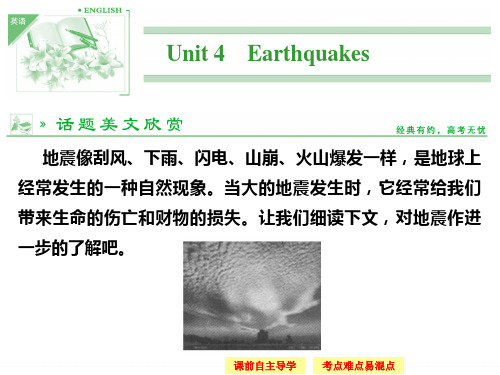
Unit 4 Earthquakes
地震像刮风、下雨、闪电、山崩、火山爆发一样,是地球上 经常发生的一种自然现象。当大的地震发生时,它经常给我们 带来生命的伤亡和财物的损失。让我们细读下文,对地震作进 一步的了解吧。
课前自主导学 考点难点易混点
An earthquake is a shaking of the ground caused by the sudden breaking and shifting1 of large sections of Earth's rocky outer shell.Earthquakes are among the most powerful events on the earth,and their results can be terrifying.A severe earthquake may release energy 10,000 times as great as that of the first atomic bomb.Rock movements during an earthquake can make rivers change their course.Earthquakes can trigger(引 发)landslides2 that cause great damage and loss of rge earthquakes beneath the ocean can create a series of huge, destructive3 waves called tsunamis(海啸)that flood coasts for many miles.
高一英语必修一unit4知识点总结
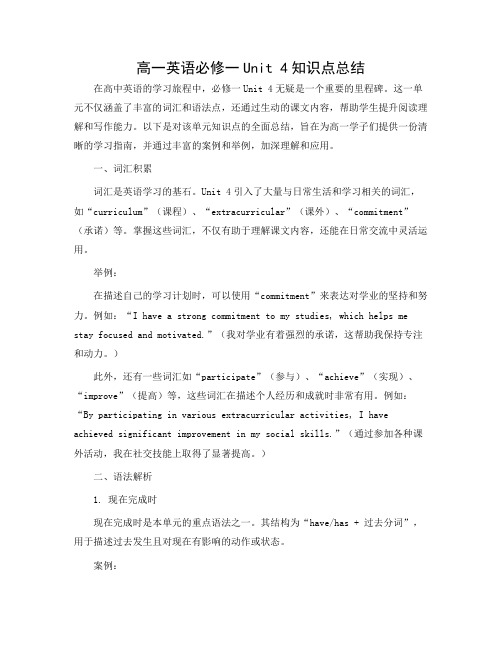
高一英语必修一Unit 4知识点总结在高中英语的学习旅程中,必修一Unit 4无疑是一个重要的里程碑。
这一单元不仅涵盖了丰富的词汇和语法点,还通过生动的课文内容,帮助学生提升阅读理解和写作能力。
以下是对该单元知识点的全面总结,旨在为高一学子们提供一份清晰的学习指南,并通过丰富的案例和举例,加深理解和应用。
一、词汇积累词汇是英语学习的基石。
Unit 4引入了大量与日常生活和学习相关的词汇,如“curriculum”(课程)、“extracurricular”(课外)、“commitment”(承诺)等。
掌握这些词汇,不仅有助于理解课文内容,还能在日常交流中灵活运用。
举例:在描述自己的学习计划时,可以使用“commitment”来表达对学业的坚持和努力。
例如:“I have a strong commitment to my studies, which helps me stay focused and motivated.”(我对学业有着强烈的承诺,这帮助我保持专注和动力。
)此外,还有一些词汇如“participate”(参与)、“achieve”(实现)、“improve”(提高)等,这些词汇在描述个人经历和成就时非常有用。
例如:“By participating in various extracurricular activities, I have achieved significant improvement in my social skills.”(通过参加各种课外活动,我在社交技能上取得了显著提高。
)二、语法解析1. 现在完成时现在完成时是本单元的重点语法之一。
其结构为“have/has + 过去分词”,用于描述过去发生且对现在有影响的动作或状态。
案例:小李在英语课上被问到:“Have you finished your homework?”(你完成作业了吗?)小李回答:“Yes, I have finished it.”(是的,我已经完成了。
高中英语必修一Unit4课件

A.highly B.high of C.well D.highly of
4. It seemed as if the world was at an end! 1) as if 似乎,好像 = as though
She spoke to me as if she knew me. 她和我说话的神情,好像她早就认识 我似的。 2) as if 在表语从句中相当于that: It seemed as if the meeting would never end. 看起来会议没完没了。
❖ eg: The police burst the door open. 警察把门撞开了。
❖ (2)burst in 突然进入(房间)
❖ eg: The police burst in and arrested the boy. 警察突然闯 进逮捕了那个男孩。
❖ (3)burst into sth. 突然或猛烈地发出或产生出某事物
ruin destroy damage
① damage 指部分“损坏”、“损害”、 “破坏”或指使用价值有所降低。它可 以用作动词, 也可以用作名词, 用作名词 时常与to something连用。
The accident did a lot of damage to his car.
② destroy 只能用作动词, 指彻底可以指希望、计划等打破。
❖ “There +be +主语+其它成分”结构中there为引导词,本身无意
,谓语动词按照就近一致原则。其它相似句型还有:
❖ There happen to be 碰巧有 ❖ There seems/appears to be 好像有 ❖ There is likely to be 可能有 ❖ There may/might be 也许有 ❖ There must be 一定有 ❖ There can’t be 不可能有 ❖ There is said/reported to be 据说/据报道有 ❖ There used to be 曾经有 ❖ There is sure/certain to be 一定有
人教版高一英语必修一Unit4 知识点 (共24张PPT)

与现在事实相 did 反 be----were 与过去事实相 had done 反
had happened.
与将来事实相 Would She opens her mouth as if 反 Could +V. she would say something. Might
5. In fifteen terrible seconds a large city lay in ruins. lie (lay, lain) 处于某种状态 to be ,remain or to be kept in a certain condition The book lay open on the table. 书本翻开着放在桌子上。 There are several houses lying empty in the town. 城里有几处空房子。
injury n. C伤害,损伤 do an injury to sb You should stretch at least ten minutes before each run to prevent injuries _______ . injured adj. 受伤的;委屈的 the injured 伤员
shock v. 使震惊,使惊愕 n. 令人震惊的事;休克;
eg: It shocks sb to see/hear…看/听到…使某人震惊 a shock to see my face on that screen. It is quite__
8. Some of the rescue workers and doctors were trapped under the ruins.
of
4. It seemed as if the world was at an end! 1. The black clouds are gathering. It looks as if it is going to rain. 2. She is dressed as if she were a millionaire. The girl listened as if she had been turned to stone. 3. She opens her mouth as if she would say something.
人教版(2019)必修第一册Unit 4课件(共8张PPT)
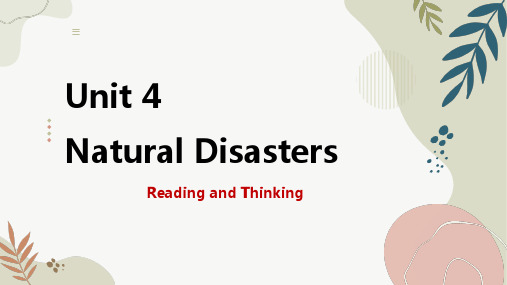
House damage
tsunami
Ground fissure Personnel casualties
The Night The Earth Didn’t Sleep
What the passage mainly talks about? earthquake
Time
In what order the passage in orgnised?
After the earthquake Dig out the people trapped and _b_u_r_y_ that dead. The city revivied itself. The _n_e_w___ look of Tang Shan appeared.
பைடு நூலகம்
Before the earthquake
4. ruin n.&vt
In less than one minute, a large city lay in ruins.
lie/be in ruins 成为废墟 fall into ruins 毁灭,毁坏
After a fierce battle, the city fell into ruins. 经过激烈的战斗,城市被毁坏了。
Everything begain to shake. A large city lay in ruins.
huge crack, river of dirt, lay in ruins,2/3 people dead or injured, people in shock
After the earthquake
限制性定语从句的功能:修饰或限定主句中的某个名词或代词(先行词)的功能。
新人教版必修一Unit4
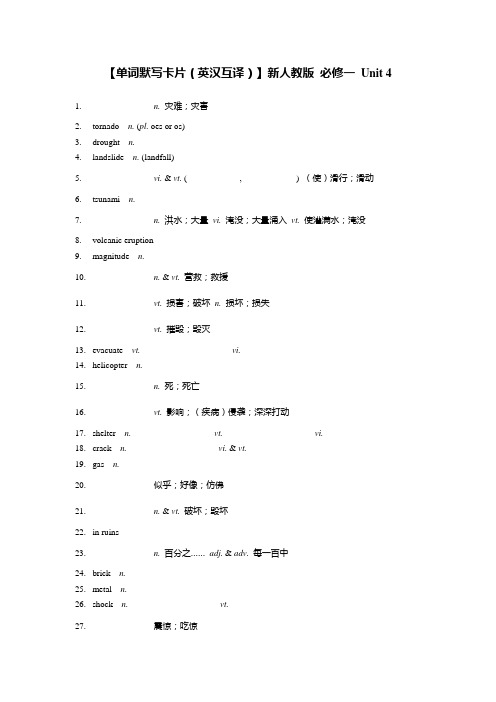
【单词默写卡片(英汉互译)】新人教版必修一Unit 41.____________ n. 灾难;灾害2.tornado n. (pl. oes or os) ____________________3.drought n. ____________________ndslide n. (landfall) ____________________5.____________ vi. & vt. (____________, ____________) (使)滑行;滑动6.tsunami n. ____________________7.____________ n. 洪水;大量vi.淹没;大量涌入vt.使灌满水;淹没8.volcanic eruption ____________________9.magnitude n. ____________________10.____________ n. & vt.营救;救援11.____________ vt.损害;破坏n.损坏;损失12.____________ vt.摧毁;毁灭13.evacuate vt. ____________________ vi. ____________________14.helicopter n. ____________________15.____________ n.死;死亡16.____________ vt.影响;(疾病)侵袭;深深打动17.shelter n. __________________ vt. ____________________ vi. ____________________18.crack n. ____________________ vi. & vt. ____________________19.gas n. ____________________20.____________ 似乎;好像;仿佛21.____________ n. & vt.破坏;毁坏22.in ruins ____________________23.____________ n.百分之……adj. & adv.每一百中24.brick n. ____________________25.metal n. ____________________26.shock n. ____________________ vt. ____________________27.____________ 震惊;吃惊28.electricity n. ____________________29.____________ vt.使落入险境;使陷入圈套n.险境;陷阱30.____________ vt. 埋葬;安葬31.____________ vi. & vt.呼吸32.revive vt. & vi. ____________________33.revival n. ____________________34.____________ n. 努力;艰难的尝试;尽力35.unify vi. & vt. ____________________36.____________ n.智慧;才智37.context n. ____________________38.____________ vt.遭受;蒙受vi.(因疾病、痛苦、悲伤等)受苦39.volcano n. (pl. oes or os) ____________________40.erupt vi. & vt. ____________________41.____________ n.供应(量);补给;[pl.] 补给品vt.供应;供给42.typhoon n. ____________________43.in the open air ____________________44.hurricane n. ____________________45.____________ vi.生存;存活vt. 幸存;艰难度过46.____________ n.电力供应;能量;力量;控制力47.tap vi. & vt. ____________________ n. ____________________48.pipe n. ____________________49.whistle vi. ____________________ vt. ___________________ n. ____________________50.____________ n.突发事件;紧急情况51.____________ adj.镇静的;沉着的vt.使平静;使镇静52.____________ n.援助;帮助;救援物资vi. & vt. (formal) 帮助;援助53.kit n. ____________________54.____________ 急救箱55.on hand ____________________56.____________ vt. & vi.碰撞;撞击n.撞车;碰撞57.____________ vt. & vi. (____________, ____________) 打扫;清扫58.____________ 消灭;彻底清除59.wave n. ____________________ vi. & vt. ____________________60.strike vi. & vt. (struck, struck/stricken) ___________________ n. ____________________61.____________ vt. & vi.递送;传达vt.发表62.summary n. ____________________63.____________ n.影响;结果;效果64.length n. ____________________【答案】1.disaster n. 灾难;灾害2.tornado n. (pl. oes or os) 龙卷风;旋风3.drought n.旱灾;久旱ndslide n. (landfall) (山地或悬崖的)崩塌;滑坡5.slide vi. & vt. (slid, slid) (使)滑行;滑动6.tsunami n.海啸7.flood n. 洪水;大量vi.淹没;大量涌入vt.使灌满水;淹没8.volcanic eruption 火山喷发9.magnitude n.(地)震级;重大10.rescue n. & vt.营救;救援11.damage vt.损害;破坏n.损坏;损失12.destroy vt.摧毁;毁灭13.evacuate vt.疏散;撤出vi.撤离14.helicopter n.直升机15.death n.死;死亡16.affect vt.影响;(疾病)侵袭;深深打动17.shelter n.避难处;居所;庇护vt.保护;掩蔽vi.躲避(风雨或危险)18.crack n.裂纹;裂缝vi. & vt.(使)破裂19.gas n.气体;燃气;汽油20.as if 似乎;好像;仿佛21.ruin n. & vt.破坏;毁坏22.in ruins 严重受损;破败不堪23.percent n.百分之……adj. & adv.每一百中24.brick n.砖;砖块25.metal n.金属26.shock n.震惊;令人震惊的事;休克vt.(使)震惊27.in shock 震惊;吃惊28.electricity n.电;电能29.trap vt.使落入险境;使陷入圈套n.险境;陷阱30.bury vt. 埋葬;安葬31.breathe vi. & vt.呼吸32.revive vt. & vi.复活;(使)苏醒33.revival n.振兴;复苏34.effort n. 努力;艰难的尝试;尽力35.unify vi. & vt.统一;(使)成一体36.wisdom n.智慧;才智37.context n. 上下文;语境;背景38.suffer vt.遭受;蒙受vi.(因疾病、痛苦、悲伤等)受苦39.volcano n. (pl. oes or os)火山40.erupt vi. & vt.(火山)爆发;(岩浆、烟等)喷出41.supply n.供应(量);补给;[pl.] 补给品vt.供应;供给42.typhoon n.台风43.in the open air 露天;在户外44.hurricane n.(尤指西大西洋的)飓风45.survive vi.生存;存活vt. 幸存;艰难度过46.power n.电力供应;能量;力量;控制力47.tap vi. & vt.轻叩;轻敲;轻拍n.水龙头;轻叩;轻敲48.pipe n.管子;管道49.whistle vi.吹口哨;发出笛声vt.吹口哨n.哨子(声);呼啸声50.emergency n.突发事件;紧急情况51.calm adj.镇静的;沉着的vt.使平静;使镇静52.aid n.援助;帮助;救援物资vi. & vt. (formal) 帮助;援助53.kit n.成套工具;成套设备54.first aid kit 急救箱55.on hand 现有(尤指帮助)56.crash vt. & vi.碰撞;撞击n.撞车;碰撞57.sweep vt. & vi. (swept, swept) 打扫;清扫58.sweep away 消灭;彻底消除59.wave n.海浪;波浪vi. & vt.挥手;招手60.strike vi. & vt. (struck, struck/stricken) 侵袭;突击;击打n.罢工;罢课;袭击61.deliver vt. & vi.递送;传达vt.发表62.summary n.总结;概括;概要63.effect n.影响;结果;效果64.length n.长;长度。
人教版高中英语必修一:Unit4+1+课件

• That mistake _r_ui_n_e_d_h_is_c_h_a_n_c_e__ of getting the job. 正是这个错误断送了他得到那份工作的机会。
Key words—1. burst
• burst v. 爆裂; 闯入; 爆炸; n. 突发,爆发 • burst into sth. (tears/laughter) 突然……起来 • burst out doing (crying/laughing) 突然……
起来
Practice
• I almost burst out l_a_u_gh_i_n_g_ when I saw what she was wearing. 当我看到她的装束时几乎 要笑出来。
• 8. Most of the buildings were completely
• d _es_t_ro_y_e_d______in the earthquake.
• 9. That boy was really lucky. After being caught in his car for 60 hours he was r_e_sc_u_e_d____.
• 2. __b_u_ry___: put sth. under the earth • 3. _r_es_c_ue___: help to get someone out of danger • 4. __pi_p_e ___: a thin metal piece that carries water • 5. __w_el_l ___: a deep place to store water to drink • 6. __in_ju_re___: hurt • 7. _s_ur_v_iv_o_r _: people who remain alive • 8. _c_an_a_l___: a very long water way for boats • 9. _p_re_p_a_re__: get ready • 10. _s_ho_c_k__: make sb. surprised
- 1、下载文档前请自行甄别文档内容的完整性,平台不提供额外的编辑、内容补充、找答案等附加服务。
- 2、"仅部分预览"的文档,不可在线预览部分如存在完整性等问题,可反馈申请退款(可完整预览的文档不适用该条件!)。
- 3、如文档侵犯您的权益,请联系客服反馈,我们会尽快为您处理(人工客服工作时间:9:00-18:30)。
Unit 4 Earthquakes Teaching aims:
1. Topic:
Basic knowledge of earthquakes; how to protect oneself and help the others in disasters
2. Useful words and expressions:
shake, well (n.), rise, smelly, pond, pipe, burst, canal, steam, dirt, ruin, injure, destroy, brick, dam, useless, steel, shock, quake, rescue, electricity, disaster, army, organize, bury, coal, shelter, fresh, percent, speech, judge, honour, prepare;
right away, (be) at an end, dig out, bring in, a (great )number of
3. Functions:
Talking about past experiences:
I will never forget the day when the earthquake took place. The time was 5:15 in the afternoon and I was driving along the road.
Sequence
4. Grammar:
The attributive clause (I)
由that, which, who, whose引导的定语从句
The number of people who were killed or injured reached more than 400,000.
It was heard in Beijing which is one hundred kilometers away.
Workers built shelters for survivors whose homes had been destroyed.
重点词组:
have time to do 有时间做某事
happen to do 碰巧做某事
shake hands with sb 握手
burst into tears/ laughter
burst out crying/laughing
突然哭/笑起来
in ruins 成为废墟
cut across 穿过、横穿
blow away 吹走、刮走
fall down 倒塌
rescue workers 救援人员
be pleased to do 乐意做某事
make/ give a speech 发表演说
judging….from 根据……来判断agree on sth 达成一致意见
give back 归还
right away= right now= at once= immediately 立刻
as you know 正如你所知道的
be known as 作为……而知名
tens of thousands of 成千上万
dig out 挖掘
a great/ large number of =a great many/good 大量的
be trapped in/ under 陷入……/ 陷在……下面
the high school speaking competition 高中演讲比赛
have sb do sth= make sb do sth= let sb do sth 让某人做某事
come to an end (vi) = put/ bring sth to an end = put/ bring an end to sth 结束某事
be proud of / take pride in 以……而自豪
invite sb to do sth 邀请某人做某事
think little of 对……评价低
invite sb for/ to sth
think highly of 对……评价高
one-third 1/3 two-thirds 2/3
seventy-five percent 75%
agree with sb
give out 发出(气味等);分发;耗尽
agree to sth
give off 发出(气味等)
agree to do sth
give away 赠送;泄露
as is known to all 众所周知
be known for 因……而出名
as could be expected 正如可以预料到的
it is useless doing sth 干某事是无用的
happen= take place= come about= break out
偶发有计划偶发战争等爆发
1. It is always calm before a storm.
2. Now, imagine there has been a big earthquake. 此句为There be 句型
3. Mice ran out of the fields looking for places to hide. 现在分词表伴随
4. It seemed that the world was at an end.
5. Water, food and electricity were hard to get.
句型:主语+ be + adj + to do 其中to do 用主动形式表示被动含义
6. All hope was not lost. all 与not 连用表示部分否定
7. It’s never too late to learn.活到老,学到老。
附:分词用法之作定语
falling leaves 正在落的叶子boiling water 正在沸腾的水fallen leaves 已经落在地上的叶子boiled water 开水
词汇讲解:
1.lie –lay-lain (v.) : to be, remain or be kept in a certain state 处于某种状态
The village lay in ruins after the war.
These machines have lain idle since the factory closed.
2.in ruins: severely damaged or destroyed 毁坏
an earthquake left the whole town in ruins.
His career is in ruins.
3.number (n.): a quantity of people or things 数目;数量
The number of people applying has increased this year.
We were fifteen in number.
a number of: a lot of
I have a number of letters to write.
A large number of people have applied.
4. injure (v.): to hurt oneself/sb./ sth. physically 受伤
He fell off the bicycle and injured his arm.
5. reach (v.): to achieve or obtain sth. 达成;达到;获得
You’ll understand it when you reach my age.
At last we reached a decision.
6. rescue (n.): an act of rescuing or being rescued 搭救;解救
A rescue team is trying to reach the trapped mines.
Rescue (v.): to save or set free from harm, in danger, or loss 解救;救出
The rescued the man from drowning.
7. trap(v.): in a place from which one wants to escape but cannot 困住;陷于绝境They were trapped in the burning hotel.
8. all …not… = not all…: some but not all 一些;但不是全部
Not all the girls left.
=Only some of them left early.
Not all the children are noisy.
=Some of the children are not noisy.
全部否定应用: none of…
None of us were allowed to go there.
None of these reports is very helpful.。
